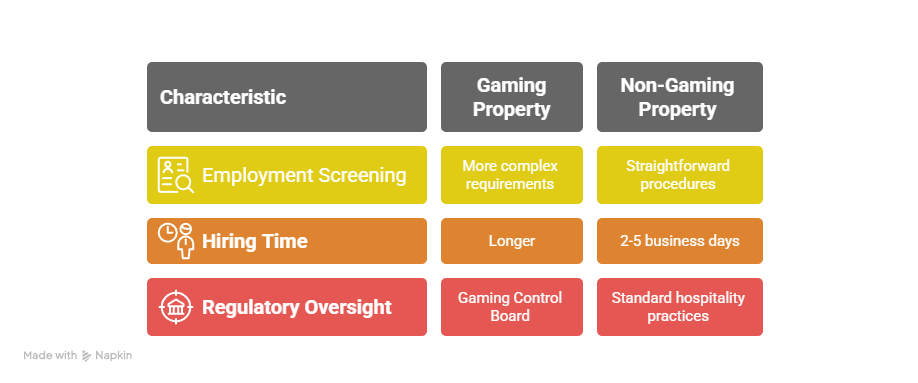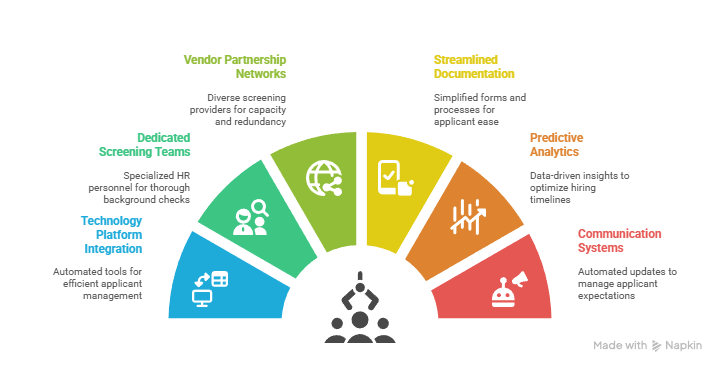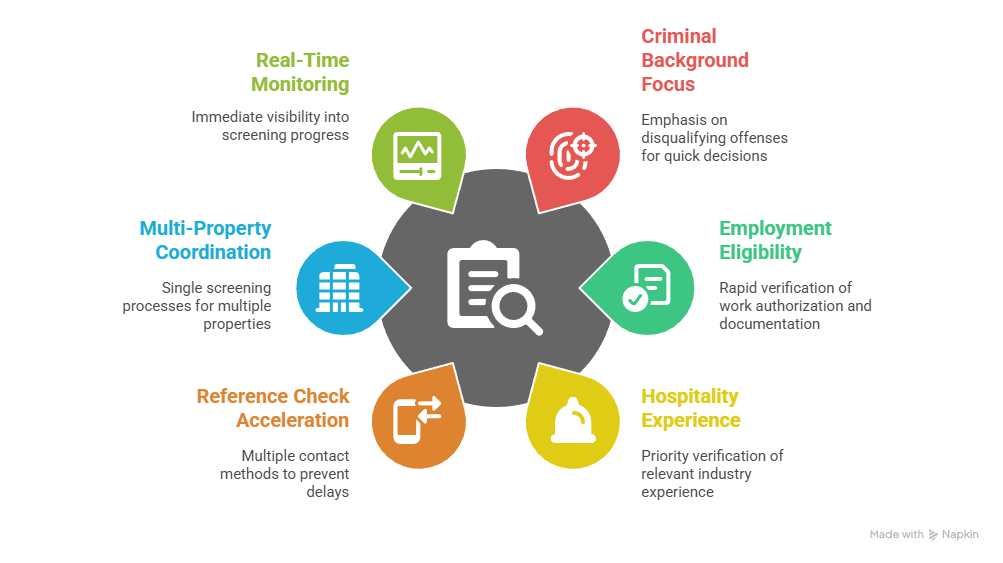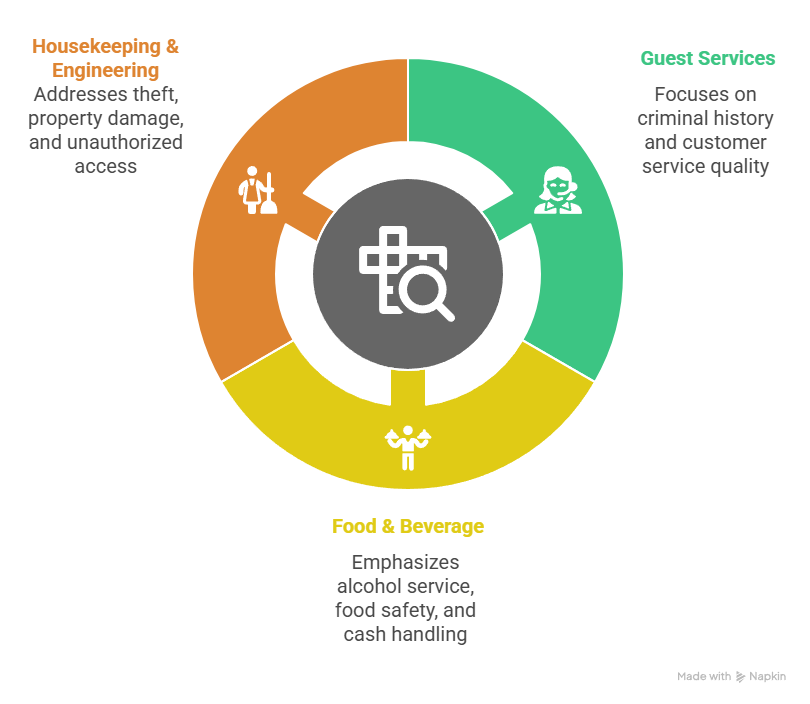Nevada hotel hiring processes combine traditional hospitality employment screening with the state's unique gaming compliance requirements, creating a complex landscape that job seekers and employers must navigate carefully. This comprehensive guide covers every aspect of hospitality employment screening in Nevada, from rapid Strip hotel hiring to Gaming Control Board requirements.
Key Takeaways
- Nevada hospitality background checks require specialized screening processes that address both standard employment verification and gaming compliance when positions involve casino operations or access.
- Strip hotels have developed rapid hiring systems that complete screening within 24-48 hours for most positions, utilizing advanced technology and streamlined verification methods during peak seasons.
- Gaming Control Board requirements may apply to hotel positions even in non-gaming roles, depending on property layout and employee access to gaming areas or sensitive operations.
- Convention season creates massive temporary staffing needs requiring abbreviated screening focused on essential safety checks rather than comprehensive background reviews.
- Different screening requirements and timelines apply based on position level, property type, and proximity to gaming operations within Nevada's integrated resort properties.
- Understanding Nevada's employment laws, FCRA compliance, and gaming regulations ensures proper screening procedures while protecting both employers and job applicants throughout the process.
Introduction
Nevada's hotel industry represents one of the most sophisticated employment markets in the United States, where traditional hospitality hiring intersects with stringent gaming regulations and high-volume seasonal demands. The state's unique position as America's premier gaming and entertainment destination means that Nevada hospitality background checks must accommodate both standard hotel industry needs and complex regulatory requirements that don't exist in other tourism markets.
The Silver State's hotel hiring process has evolved dramatically over the past decade, driven by technological advances, regulatory changes, and the industry's need to efficiently staff massive integrated resort properties. Las Vegas Strip hotels alone employ tens of thousands of workers across hundreds of different positions, from traditional hotel operations to gaming, entertainment, retail, and specialized service roles that require varying levels of security clearance and background verification.
Understanding Nevada's hotel hiring landscape is essential for job seekers, HR professionals, staffing agencies, and employers navigating this dynamic market. The process involves federal compliance requirements, state-specific employment laws, and potential gaming regulatory oversight that creates complexity not found in other hospitality markets. Success requires understanding these multiple layers of requirements and how they interact to create the comprehensive screening processes that protect Nevada's hospitality industry reputation and regulatory standing.
Nevada's Unique Hospitality Employment Landscape

Nevada's hotel hiring process operates within a regulatory framework that combines traditional employment screening with gaming industry oversight, creating a dual compliance environment that sets the state apart from other hospitality markets. This unique structure reflects Nevada's position as the nation's primary gaming jurisdiction and the integrated nature of most major hospitality properties that combine hotel operations with casino gaming, entertainment venues, and retail establishments.
The state's hospitality employment market serves multiple distinct segments, each with different screening requirements and hiring timelines. Traditional hotels without gaming operations follow standard employment verification protocols, while integrated resort properties must consider Gaming Control Board requirements even for positions that don't directly involve gaming activities. This complexity requires sophisticated hiring processes that can accommodate different regulatory requirements while maintaining efficiency and compliance.
Nevada's seasonal employment patterns create additional challenges for hotel hiring processes. The state experiences dramatic staffing fluctuations tied to convention schedules, entertainment events, and tourist seasons that require flexible screening procedures capable of handling high-volume hiring surges without compromising quality or regulatory compliance.
- Integrated Resort Complexity: Properties combining hotels, casinos, entertainment, and retail create diverse screening requirements
- Gaming Regulatory Overlap: Hotel positions may require gaming compliance even without direct gaming involvement
- Seasonal Volume Fluctuations: Convention and tourist seasons drive massive temporary hiring needs
- Multi-jurisdictional Workforce: Nevada attracts workers from neighboring states requiring interstate background verification
- Technology Integration Requirements: Advanced screening platforms essential for managing high-volume, complex hiring processes
The most successful Nevada hotel employers develop comprehensive hiring strategies that anticipate these unique challenges while leveraging the state's advantages, including a large hospitality-experienced workforce, sophisticated vendor networks, and streamlined regulatory processes designed to support industry needs.
Gaming vs. Non-Gaming Property Requirements

Hotels without gaming operations follow relatively straightforward employment screening procedures focusing on criminal background checks, employment verification, and standard hospitality industry requirements. These properties can typically complete hiring processes within 2-5 business days for most positions, utilizing standard background screening vendors and procedures common throughout the hospitality industry.
Gaming properties or hotels within casino complexes face significantly more complex requirements, even for traditional hotel positions. Housekeeping staff, food service workers, and maintenance personnel may need Gaming Control Board registration if their duties provide access to gaming floors, cash handling areas, or other sensitive operational spaces within integrated resort properties.
Strip Hotel Rapid Hiring Systems and Processes
Las Vegas Strip hotels have pioneered sophisticated rapid hiring systems designed to meet the extraordinary staffing demands of major resort operations while maintaining strict security and compliance standards. These properties employ thousands of workers across dozens of departments, creating hiring challenges that require innovative approaches to employment screening and onboarding processes.
Strip hotel hiring systems combine advanced technology platforms, streamlined procedures, expert vendor relationships, and dedicated HR teams specialized in high-volume recruitment and screening. These integrated approaches enable properties to hire hundreds of employees within weeks during peak seasons while ensuring all regulatory requirements and security standards are consistently met.
The most successful Strip properties maintain year-round recruitment activities, building candidate pipelines that can be activated quickly when hiring surges occur. These proactive approaches include community partnerships, educational institution relationships, and referral programs that provide access to pre-qualified candidates who can move through screening processes more rapidly when positions become available.
Rapid Hiring System Components:

- Technology Platform Integration: Automated applicant tracking, screening coordination, and status monitoring
- Dedicated Screening Teams: Specialized HR personnel focused exclusively on background verification coordination
- Vendor Partnership Networks: Relationships with multiple screening providers to ensure capacity and redundancy
- Streamlined Documentation: Simplified forms and mobile-friendly processes that reduce applicant barriers
- Predictive Analytics: Data-driven approaches to anticipate hiring needs and optimize screening timelines
- Communication Systems: Automated updates and clear timelines that manage applicant expectations effectively
These comprehensive systems represent significant investments in hiring infrastructure that pay dividends through reduced time-to-hire, improved applicant experiences, and consistent compliance with Nevada's complex regulatory requirements.
24-Hour Screening Achievements
Leading Strip hotels achieve 24-48 hour screening completion for many positions through careful process design and technology utilization. These rapid timelines require automated database searches, parallel verification processes, and immediate escalation procedures for issues requiring human intervention or additional investigation.
Success factors include comprehensive applicant preparation materials, multiple document submission channels, real-time status monitoring, and dedicated staff available to resolve issues immediately. Properties often conduct preliminary interviews and orientation activities while background screening progresses, enabling immediate onboarding once clearances are complete.
Volume Management During Peak Seasons
Convention seasons and special events create hiring surges that can overwhelm standard screening processes without proper preparation and system design. Strip hotels manage these volume challenges through capacity planning, vendor coordination, temporary staffing augmentation, and prioritization systems that ensure critical positions are filled first while maintaining quality standards throughout the process.
Advanced analytics help predict hiring needs based on booking patterns, historical data, and event schedules, enabling proactive screening preparation and resource allocation that prevents bottlenecks during critical hiring periods.
Gaming Control Board Integration in Hotel Hiring

The Nevada Gaming Control Board's sophisticated regulatory system extends beyond direct gaming positions to include many hotel roles within casino properties, creating complex compliance requirements that successful employers navigate through expertise, procedures, and technology integration. Understanding Gaming Control Board requirements is essential for hotel hiring in Nevada's integrated resort environment.
Gaming Control Board employment screening examines multiple aspects of applicant backgrounds, including criminal history across all jurisdictions, financial stability and responsibility, personal associations that could create conflicts or compromise integrity, and overall character assessment for positions of trust within regulated environments. The process involves fingerprinting, detailed verification of employment and education claims, financial disclosure requirements, and potentially personal interviews with regulatory investigators.
Hotel positions requiring Gaming Control Board oversight vary significantly based on property layout, operational structure, and specific job responsibilities. Housekeeping staff may need gaming registration if they clean gaming areas, food service workers require clearance if they serve casino floors, and maintenance personnel need approval if they access gaming equipment or cash handling areas.
| Position Type | Gaming Requirement | Processing Time | Key Screening Elements |
| Hotel Front Desk (Non-Gaming) | None | 2-3 days | Criminal, Employment |
| Hotel Front Desk (Casino Property) | Registration | 1-2 weeks | Criminal, Employment, Gaming |
| Hotel Management | License/Registration | 2-8 weeks | Comprehensive Review |
| Gaming-Adjacent Service | Registration | 1-3 weeks | Criminal, Employment, Character |
The Gaming Control Board's approach emphasizes protecting Nevada's gaming industry integrity while supporting employment opportunities for qualified individuals. This balance requires sophisticated screening processes that evaluate risk appropriately while providing fair opportunities for employment and career advancement within Nevada's hospitality industry.
Registration vs. Licensing Requirements
Gaming registration represents a lower level of Gaming Control Board oversight suitable for many hotel positions that don't directly involve gaming but require access to casino areas or gaming-adjacent responsibilities. Registration typically requires basic background screening, fingerprinting, and character assessment but doesn't involve the comprehensive financial review required for gaming licensing.
Gaming licensing applies to positions with direct gaming responsibilities or significant operational authority within casino environments. These positions undergo extensive background investigation including detailed financial disclosure, comprehensive character assessment, and potentially polygraph examinations or personal interviews with Gaming Control Board investigators.
Expedited Processing Programs
The Gaming Control Board offers expedited processing for certain positions and circumstances, particularly during peak hiring periods when properties need rapid staffing increases. These programs require additional fees but can significantly reduce processing timelines for qualified applicants with clean backgrounds and complete documentation.
Understanding expedited processing eligibility and requirements helps hotel employers plan hiring timelines more effectively and communicate realistic expectations to applicants during recruitment and screening processes.
Convention and Event Staffing Screening
Nevada's convention and special event industry creates massive temporary staffing needs that require specialized background screening approaches balancing security requirements with practical hiring timelines. Major events like the Consumer Electronics Show, National Association of Broadcasters, SEMA, and numerous trade shows generate demand for thousands of temporary hospitality workers across hotels, convention centers, transportation services, and event venues throughout the state.
Convention staffing agencies serving Nevada properties have developed streamlined screening processes focusing on essential safety and security checks rather than comprehensive background reviews that might delay hiring for short-term assignments. These abbreviated processes typically emphasize criminal history relevant to guest safety and property security, employment eligibility verification, and basic reference checks with previous hospitality employers.
The event-driven nature of convention staffing creates unique challenges requiring flexible screening procedures, multi-property coordination capabilities, and rapid processing systems that can handle volume surges during major event periods. Successful agencies maintain relationships with multiple verification sources, understand various property requirements, and coordinate screening for workers who may serve multiple clients during single events or across convention seasons.
Convention Screening Priorities:

- Criminal Background Focus: Emphasis on disqualifying offenses rather than comprehensive history reviews
- Employment Eligibility Verification: Rapid confirmation of work authorization and documentation
- Previous Hospitality Experience: Priority verification of relevant industry experience and performance
- Reference Check Acceleration: Multiple contact methods and backup references to prevent delays
- Multi-Property Coordination: Single screening processes serving multiple client properties during events
- Real-Time Status Monitoring: Immediate visibility into screening progress and potential issues
These specialized approaches enable convention staffing while maintaining security standards essential for Nevada's hospitality industry reputation and guest safety expectations.
Multi-State Workforce Coordination
Nevada convention staffing frequently involves workers from neighboring states, particularly California, Arizona, Utah, and Colorado, requiring background screening that accounts for out-of-state criminal records, employment history, and professional licensing or certification requirements. Staffing agencies maintain access to multi-jurisdictional databases and understand interstate information sharing agreements that enable comprehensive screening without extending processing timelines unnecessarily.
Cross-border staffing considerations include different state employment laws, tax obligations, transportation logistics, and professional licensing requirements that may affect worker eligibility or placement options during specific events or seasonal periods.
Event-Specific Security Requirements
Different types of conventions and events may impose varying security requirements that affect background screening scope and intensity. High-profile events, government-related conferences, or technology exhibitions might require enhanced screening procedures, while general trade shows typically utilize standard convention screening protocols.
Understanding event-specific requirements helps staffing agencies and hotel employers plan appropriate screening procedures and communicate accurate timelines and expectations to temporary workers during recruitment and hiring processes.
Position-Specific Screening Requirements and Procedures
Nevada hotel hiring processes must account for varying screening requirements across different position types, operational responsibilities, and regulatory requirements that create a complex matrix of verification needs and compliance obligations. Understanding these position-specific requirements enables employers to design efficient screening programs while ensuring appropriate risk management and regulatory compliance throughout their operations.

Hotel positions fall into several broad categories with different screening priorities and requirements. Guest-facing roles emphasize criminal background verification relevant to customer safety and property security, while back-of-house positions focus on operational integrity and workplace safety considerations. Management and supervisory positions require enhanced screening reflecting their authority and responsibility within hotel operations.
The integrated nature of many Nevada hotel properties creates additional complexity, as traditional hotel positions may require gaming compliance screening depending on property layout, operational structure, and specific job responsibilities that could provide access to gaming areas or sensitive operational functions.
Guest Services and Front Office Operations
Front office positions undergo screening focused on criminal history that could impact guest safety, property security, or customer service quality. Hotels prioritize reviewing theft, fraud, violence, and drug-related offenses while considering rehabilitation evidence, time elapsed since incidents, and overall applicant qualifications and character assessment.
These positions typically complete background screening within 48-72 hours for non-gaming properties, or 1-2 weeks when Gaming Control Board registration is required. Employers often conduct preliminary interviews, skills assessment, and training preparation while background screening progresses, enabling rapid onboarding once clearances are complete.
Front Office Screening Elements:
- Criminal Background Review: Focus on guest safety and property security relevant offenses
- Employment History Verification: Emphasis on customer service experience and performance
- Reference Checks: Previous hospitality employers and supervisors when available
- Skills Assessment: Computer literacy, communication abilities, and hospitality knowledge
- Professional Appearance Standards: Grooming and presentation suitable for guest interaction roles
Front office screening emphasizes finding qualified candidates who can represent hotel properties professionally while ensuring guest safety and security throughout their interactions and responsibilities.
Food and Beverage Service Positions
Restaurant, bar, and room service operations within Nevada hotels require screening that addresses both traditional hospitality considerations and specific requirements related to alcohol service, food safety, and cash handling responsibilities that are common in these operational areas.
Food and beverage screening often includes verification of required certifications such as responsible beverage service training, food handler permits, and other industry-specific credentials that may be mandatory for legal compliance in restaurant and bar operations within hotel properties.
Housekeeping and Engineering Services
Back-of-house positions often involve access to guest rooms, property systems, valuable equipment, and sensitive operational areas, requiring screening protocols that address theft, property damage, workplace safety, and unauthorized access concerns that could compromise guest security or operational integrity.
These positions may require Gaming Control Board registration when duties involve cleaning or maintaining gaming areas, even though the primary job responsibilities are traditional hotel housekeeping or maintenance functions within integrated resort properties.
Legal Compliance and Risk Management Framework
Nevada hotel hiring processes must navigate complex legal requirements combining federal Fair Credit Reporting Act (FCRA) compliance with state-specific employment laws and potential gaming regulatory oversight that creates multi-layered compliance obligations. Understanding these requirements protects both employers and applicants while ensuring fair and legal screening practices throughout Nevada's hospitality industry.
The state's employment law framework includes "ban the box" provisions prohibiting criminal history inquiries on initial applications for most positions, though exceptions exist for gaming-licensed roles and positions involving vulnerable populations or significant security responsibilities. Employers must design application and screening processes that comply with these requirements while gathering necessary information for hiring decisions.
FCRA compliance creates federal obligations for disclosure, written authorization, adverse action procedures, and dispute resolution that apply to all employment screening activities regardless of state law requirements. These federal requirements establish minimum standards that Nevada employers must meet consistently to avoid legal exposure and regulatory sanctions.
Nevada Employment Law Compliance Requirements:
- Ban the Box Compliance: No criminal history questions on initial applications (with specific exceptions)
- Written Authorization: Clear disclosure and consent for all background screening activities
- Adverse Action Procedures: Specific steps when making negative employment decisions based on screening
- Record Retention Requirements: Proper storage, access controls, and disposal of screening documentation
- Dispute Resolution Procedures: Processes for applicants to challenge background check accuracy or completeness
- Privacy Protection: Safeguards for sensitive personal information throughout screening and hiring processes
These compliance requirements create procedural obligations that successful employers integrate into their hiring systems through training, technology, and ongoing monitoring to ensure consistent adherence to legal requirements while supporting efficient operations.
Documentation and Record Management Systems
Comprehensive documentation systems demonstrate compliance with federal and state requirements while providing audit trails for Gaming Control Board reviews when applicable. Proper record-keeping protects against legal challenges, supports continuous improvement in screening procedures, and enables effective response to regulatory inquiries or applicant disputes.
Best practices include secure digital storage systems with controlled access protocols, automated retention schedule management, regular audit procedures, and integration with broader HR information systems that provide comprehensive visibility into hiring and employment activities.
Training and Ongoing Compliance Monitoring
Successful compliance requires ongoing training for HR personnel, hiring managers, and other staff involved in screening and hiring processes. Regular training ensures understanding of current requirements, proper procedures, and appropriate responses to complex situations that may arise during background screening activities.
Compliance monitoring systems track key metrics, identify potential issues, and provide early warning of problems that could create legal exposure or regulatory concerns for hotel employers throughout Nevada's hospitality industry.
Cost Management and Budget Optimization Strategies
Nevada hotel hiring costs vary significantly based on screening scope, processing urgency, volume considerations, and position-specific requirements that create complex budget planning challenges for hospitality employers. Understanding these cost factors enables effective budget development while optimizing screening programs for maximum efficiency and return on investment.
Basic employment verification for standard hotel positions typically costs $25-50 per applicant, covering criminal background checks, employment history verification, and reference checks sufficient for most front-line hospitality roles. Enhanced screening including credit checks, education verification, and expanded criminal history searches ranges from $45-85 per candidate depending on specific requirements and vendor pricing structures.
Gaming-related screening costs increase significantly due to Gaming Control Board fees, enhanced investigation requirements, and extended processing timelines that may require expedited processing fees to meet hiring schedule needs. Comprehensive gaming license support can cost $200-400 per applicant when including all required elements and potential rush processing fees.
| Screening Level | Standard Cost | Rush Processing | Volume Discounts | Typical Positions |
| Basic Hotel Screen | $25-40 | $40-65 | 15-25% | Housekeeping, Food Service |
| Enhanced Hotel Screen | $45-85 | $70-125 | 20-30% | Front Desk, Guest Services |
| Gaming Registration Support | $125-200 | $200-300 | 10-20% | Casino-Adjacent Roles |
| Gaming License Support | $250-400 | $400-600 | 5-15% | Gaming Management |
Volume pricing negotiations with screening vendors can achieve substantial cost savings during high-volume hiring periods, with annual contracts providing guaranteed minimum volumes in exchange for reduced per-screening costs and priority processing during peak demand periods.
Hidden Costs and Total Cost of Ownership
Beyond direct screening fees, Nevada hotel employers must consider indirect costs including HR staff time for coordination and follow-up, training expenses for compliance and procedure updates, technology platform fees and integration costs, and potential delays or complications that extend hiring timelines and increase overall recruitment expenses.
Successful budget planning accounts for these hidden costs while identifying opportunities for process improvements that can reduce total cost of ownership through automation, vendor optimization, and procedure streamlining that improves efficiency without compromising quality or compliance.
Return on Investment Analysis
Effective screening programs generate positive returns through reduced turnover, improved employee performance, decreased security incidents, and enhanced regulatory compliance that protects against costly violations or legal challenges. Measuring these benefits requires comprehensive tracking of hiring outcomes and long-term employee performance metrics.
ROI analysis helps justify screening program investments while identifying opportunities for optimization that can improve both financial performance and hiring outcomes throughout Nevada's competitive hospitality employment market.
Conclusion
Nevada's hotel hiring process represents a sophisticated integration of traditional hospitality employment practices with complex gaming regulatory requirements that enable rapid, compliant screening in America's premier hospitality market. Strip hotels have pioneered innovative rapid hiring systems that accommodate massive seasonal staffing demands while maintaining strict security standards essential for gaming and hospitality operations. Understanding position-specific screening requirements, legal compliance obligations, and cost optimization strategies enables both employers and job seekers to navigate Nevada's unique hospitality employment landscape effectively while supporting the state's world-class hospitality industry reputation.
Frequently Asked Questions
How long do Nevada hospitality background checks take to complete?
Standard hotel positions typically complete background screening within 2-5 business days, while gaming-adjacent roles requiring Gaming Control Board clearance may take 2-8 weeks depending on the position level and investigation complexity.
Do all hotel employees in Nevada need gaming licenses?
Not all hotel employees need gaming licenses, but those working in casino areas or having access to gaming floors often require Gaming Control Board registration or licensing, even for non-gaming hospitality roles like housekeeping or food service.
Can Nevada hotels hire employees before background checks are complete?
Some Nevada hotels may offer conditional employment pending background check completion, but this varies by property policy and position type. Gaming-licensed positions typically cannot begin work until all clearances are finalized.
What disqualifies someone from Nevada hospitality employment?
Disqualifying factors vary by position but commonly include recent felony convictions, theft or fraud history, violent crimes, and for gaming positions, financial instability or associations that could compromise integrity.
Are background check requirements different for temporary convention staff?
Temporary convention staff usually undergo streamlined screening focusing on criminal history and basic employment verification rather than comprehensive financial reviews, enabling faster hiring while maintaining essential security standards.
How much do Nevada hospitality background checks cost?
Costs range from $25-50 for basic employment verification to $200-300 for comprehensive gaming-related screening, with rush processing typically adding 50-100% to standard pricing.
What happens if someone fails a Nevada hospitality background check?
Failed background checks trigger adverse action procedures including pre-adverse action notices, dispute rights information, and opportunities for applicants to provide additional information or corrections before final employment decisions.
Can out-of-state workers get hired for Nevada hospitality positions?
Yes, but background screening must include their previous state records, and some positions may require Nevada-specific certifications or gaming registrations that could extend processing times.
Additional Resources
- Nevada Gaming Control Board Employment Requirements
https://gaming.nv.gov/index.aspx?page=78 - Fair Credit Reporting Act Compliance Guide
https://www.ftc.gov/enforcement/rules/rulemaking-regulatory-reform-proceedings/fair-credit-reporting-act - Nevada Department of Business and Industry Employment Resources
https://business.nv.gov/ - Las Vegas Convention and Visitors Authority Workforce Development
https://www.lvcva.com/ - Nevada Resort Association Industry Guidelines
https://www.nevadareport.com/ - U.S. Equal Employment Opportunity Commission Background Check Guidance
https://www.eeoc.gov/laws/guidance/arrest-conviction-records-employment-decisions - Nevada Employment Security Division Resources
https://detr.nv.gov/ - Las Vegas Global Economic Alliance Workforce Development
https://lvgea.org/

GCheck Editorial Team
Meet the GCheck Editorial Team, your trusted source for insightful and up-to-date information in the world of employment background checks. Committed to delivering the latest trends, best practices, and industry insights, our team is dedicated to keeping you informed.
With a passion for ensuring accuracy, compliance, and efficiency in background screening, we are your go-to experts in the field. Stay tuned for our comprehensive articles, guides, and analysis, designed to empower businesses and individuals with the knowledge they need to make informed decisions.
At GCheck, we're here to guide you through the complexities of background checks, every step of the way.






